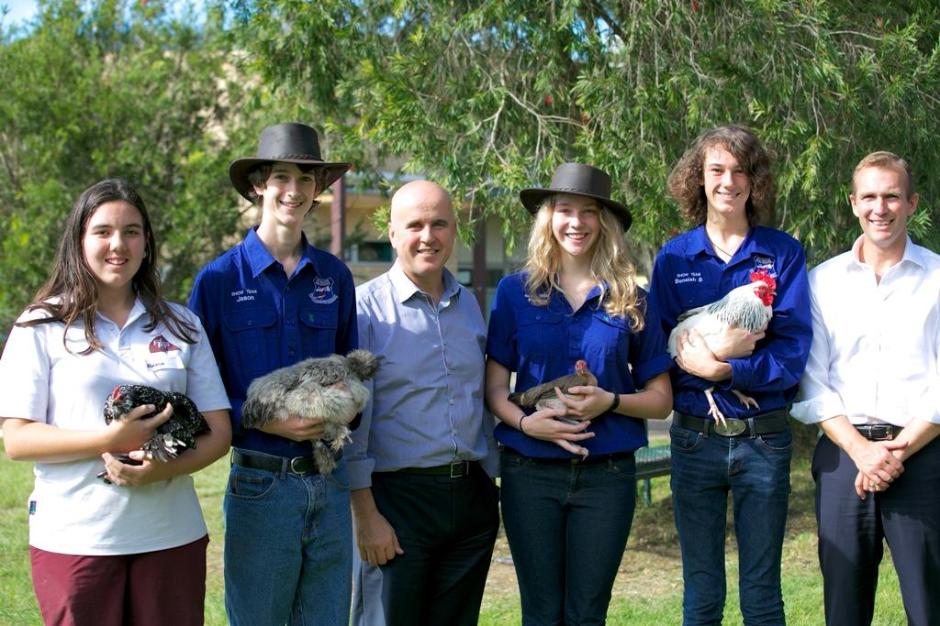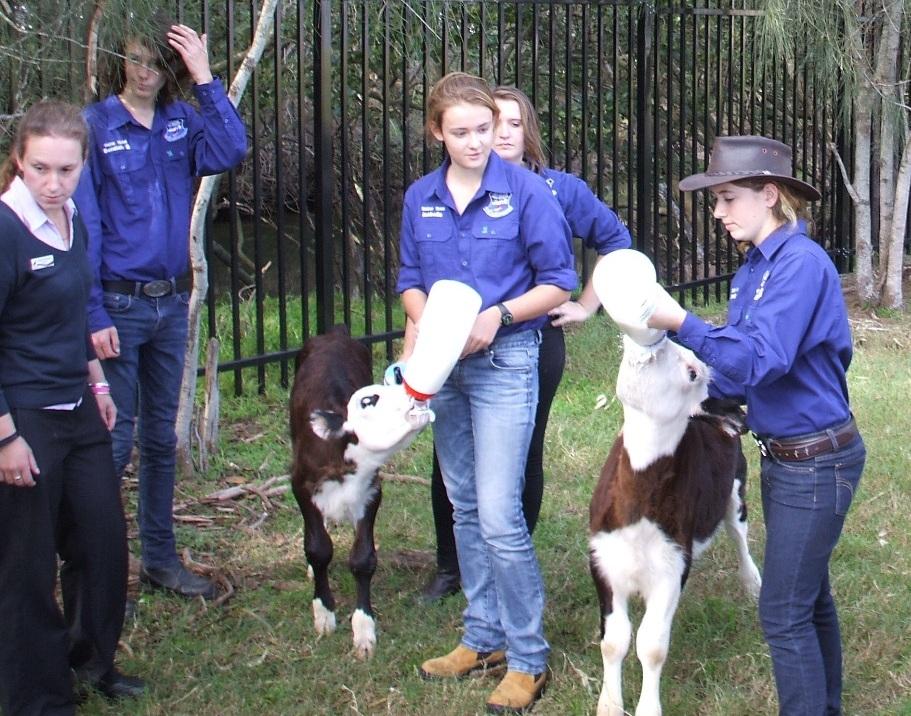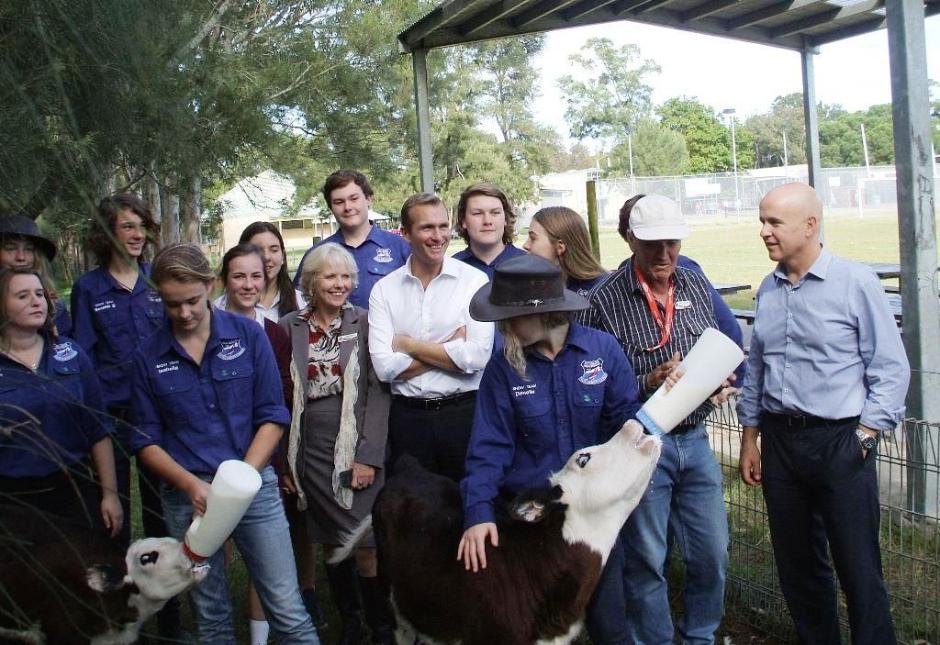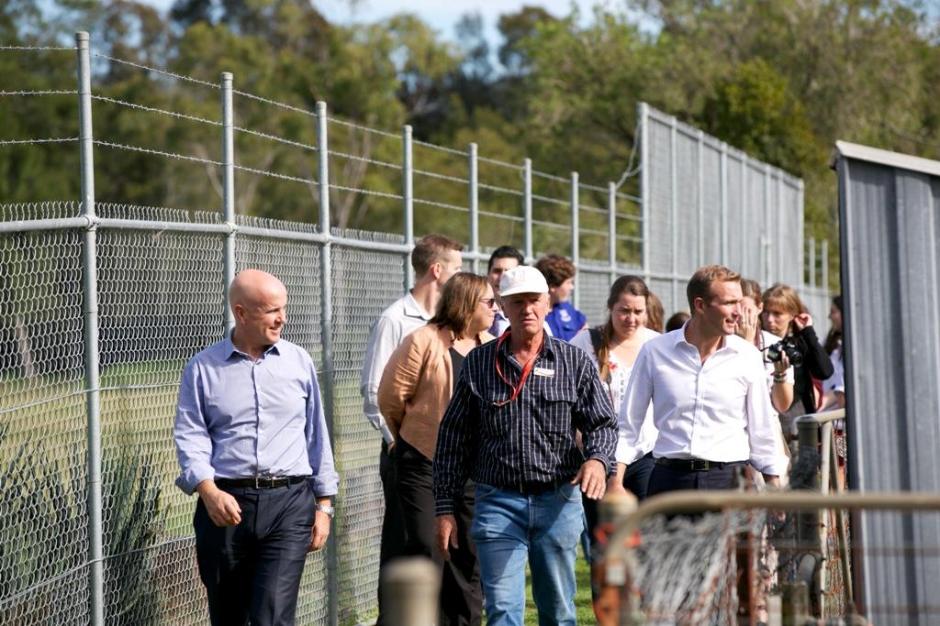May 24 - 30, 2015: Issue 215
Schools Helping Schools Deliver On Agricultural Education - Pittwater High School - A Lighthouse School

Minister for Education Adrian Piccoli and MP for Pittwater Rob Stokes with Pittwater High School students on Wednesday this week.
Thursday 21 May 2015
Minister for Education Adrian Piccoli has announced the first seven NSW public schools selected to lead the way in the future delivery of agricultural education.
“The teachers at these schools will now play a mentoring role with their colleagues in other schools across the State,” Mr Piccoli said.
“Agriculture contributes around $9 billion to the NSW economy every year and it is critical that we have relevant, high-quality agricultural education and training.
“These schools have been selected for outstanding student engagement and career promotion in Agriculture and Primary Industries.”
The first lighthouse schools established as a response to the recommendations of the Pratley Review into Agricultural Education and Training in NSW are:
• Colo High School
• Junee High School
• Kempsey High School
• Pittwater High School
• Mount View High School
• Murrumburrah High School
• Tumut High School
Pittwater High School is the only urban school selected as a lighthouse school for the teaching of Agriculture and Primary Industries.
“It’s great to see an urban school among those leading the way in agricultural education,” Mr Piccoli said.
“To be chosen to be part of this program is a particular honour for Pittwater High because they are showing these exemplary standards in an urban environment,” Member for Pittwater and Minister for Planning Rob Stokes said.
“Pittwater High has a proud history of agricultural education and this announcement recognises and rewards its innovation and success on a state-wide scale.”
Other NSW schools will be invited to submit Expressions of Interest to join the lighthouse schools group later this year.
The Agriculture course in Year 8 sets out to develop the students' knowledge and understanding of agricultural enterprises and the practices and skills required in producing plant and animal products. It does this in a very practical way. Everything studied in theory is backed up with at least 50% of the available class time taken up with practical exercises. Students, for example, will grow their own crops, raise their own chickens and worms and eat the honey extracted from the school's beehives.
Agriculture in Years 9 & 10 involves 50% of the time being allocated to practical aspects after theory has been studied. Successfully raising plants and animals is the main goal of the course. To meet this end students are encouraged to develop attitudes relating to personal achievement, a critical approach to agricultural problems and an interest in conservation of resources, with an edible product at the end
Four agricultural perspectives are considered in this course:
• Plant, animal and environmental interactions
• Management of these interactions
• Patterns in Agriculture
• Farming for the future
Practical experience in raising plants and animals is required specifically by the syllabus. Observation, analysis and interpretations are skills to be developed. Specific areas that may be included in Year 9 and 10 are:
• Sheep, beef, cattle, pigs and dairy cattle
• Herbs, potatoes, hydroponics and vegetables
• Experimenting and problem solving
A study of each industry may involve a historical/geographical perspective, problems particular to the industry and methods of solving these problems. Skills involved in producing the end product are taught where facilities are available. Excursions and farm visits are proving a popular part of this course.
Assessment is based on practical skills tests, topic tests and homework tasks.
Find out more at: www.pittwater-h.schools.nsw.edu.au


Background - Previously
Review into Agricultural Education and Training in New South Wales - from website:
The review considered the appropriateness of agricultural education and training programs in the NSW school and tertiary sectors, the promotion of career opportunities and workforce needs in the agricultural sector, and how NSW government-owned agricultural education, training and research institutions and other facilities can be best positioned to meet future industry needs.
The review was conducted by Professor Jim Pratley, an eminent research professor of agriculture at Charles Sturt University. Professor Pratley has 40 years of experience in the field of agriculture with particular interests in conservation farming, weed management, herbicide resistance and allelopathy.
In undertaking the review Professor Pratley invited submissions in response to an Issues paper released in October 2012.
Report 'Review into Agricultural Education and Training in New South Wales' and associated documents here
From this report:
THE ‘LIGHTHOUSE’ CONCEPT
It is also recognised that the agricultural high schools are few in number and their geographic spread is limited. Other schools also have substantial Agriculture and Primary Industries programs, facilities and expertise. These schools also need to be encouraged to develop, and to play a leadership role. Within the Australian education system the terminology of ‘lighthouse schools’ has been used, whereby the school is designated with the responsibility of improving an aspect of the teaching program, learning experiences or system change in a region or state.
Special funding usually accompanies the designation of a lighthouse school in consideration of the extra workloads such designation imposes. The lighthouse school concept would appear to be highly relevant to the need to elevate the quality of the educational experience around the state in Agriculture and Primary Industries.
New focus on agricultural education
Media Release: 12 December, 2013
The Minister for Education, Adrian Piccoli, and Minister for Primary Industries, Katrina Hodgkinson, today announced the NSW Government's response to a report into agricultural education and training in the State.
Mr Piccoli said the report, authored by Professor Jim Pratley, a Professor of Agriculture at Charles Sturt University, was commissioned to ensure agricultural education remained relevant to the industry.
"Agriculture contributes around $9 billion to the NSW economy every year, so it is vital that the education offered to students reflects current best-practice," Mr Piccoli said.
"The report assessed current and projected industry and workforce needs, and how effectively current school, Vocational Education and Training and higher education programs respond to those needs."
Ms Hodgkinson said the NSW Government's response positions government education, training and research institutions to more readily respond to developments in the industry.
"The NSW Government's response to the review will involve the whole education and agriculture sectors – schools, TAFE, the Board of Studies and the Department of Primary Industries – in a comprehensive upgrade over time of the options available to students," Ms Hodgkinson said.
"By matching agricultural education courses to the knowledge of industry, we can better support students moving from study to employment, and help to ensure the industry has a workforce with the right skills."
Key recommendations supported by the NSW Government include:
Improving agricultural careers advice given in schools, and consideration of establishing an ‘Agriculture and Food Week' during the school year;
Developing a statement on teaching about agriculture in primary school for primary teachers including advice about resources that can be used to support teaching about agriculture;
Ensuring primary teacher training and professional development provides the necessary expertise to deliver teaching about agriculture and food through science and the broader primary curriculum;
Including agriculture, food and fibre as the basis of at least one content area in Year 7 and 8 Technology;
Agricultural high schools be considered ‘specialist schools' for education and training in agriculture and primary industries, where all students are encouraged to study the subjects, and specialist agriculture teaching staff are directly appointed;
Agricultural high schools work more closely together as a forum for professional development, to share equipment, and to be a contact agency for former students;
Schools with strong agriculture programs have greater opportunity to share their expertise as ‘lighthouse' schools;
Consideration be given to re-establishing the Murrumbidgee College of Agriculture;
Aboriginal students are better supported to take up opportunities for employment and further education and training in agriculture; and
Department of Primary Industries' research centres hold annual forums for agriculture teachers.
Mr Piccoli said the NSW Government will support 26 of the 27 recommendations to Government, and strongly encourages industry to consider its capacity to implement the review's 15 recommendations to industry.
